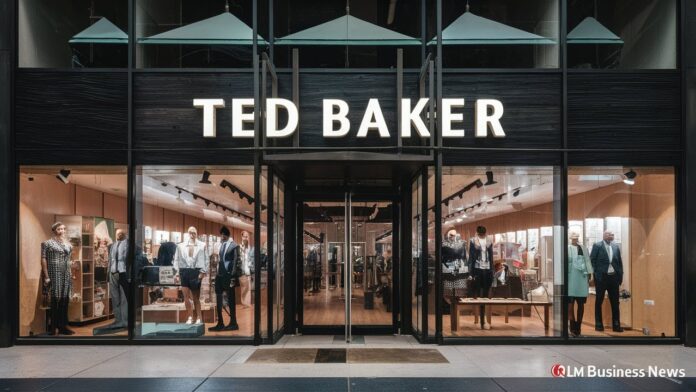Fashion retailer Ted Baker announces the closure of its last 31 UK stores this week, following financial difficulties and a recent administration.
Ted Baker, the British fashion brand renowned for its distinctive designs and floral patterns, is preparing to shut down its remaining 31 stores across the UK this week, affecting over 500 employees. This move comes five months after the company entered administration due to mounting financial troubles.
Founded in Glasgow in 1988 by Ray Kelvin, Ted Baker initially gained popularity with its quirky advertising and unique style. Over the years, it expanded from a men’s clothing label into a well-known fashion brand, eventually becoming a staple in the UK high street scene. However, the brand faced significant challenges in recent years, including increased competition, a shift toward online shopping, and a costly fallout from Kelvin’s departure in 2019 following allegations of inappropriate behaviour.
In March, Ted Baker’s UK operations went into administration after racking up substantial losses. The administration led to the closure of 15 stores and the redundancy of about 245 staff members. Now, the final 31 stores are set to close, with the remaining staff facing uncertain futures.
Authentic Brands Group, which acquired Ted Baker for £211 million in 2022, still owns the brand’s intellectual property but has struggled to keep the retail business afloat. Efforts to find a new partner to manage Ted Baker’s UK and European operations, including talks with Mike Ashley’s Frasers Group, have been unsuccessful.
The brand’s troubles reflect broader issues in the UK fashion industry. An unseasonably cold spring and early summer, combined with the ongoing cost-of-living crisis, have dampened consumer spending on non-essential items. Ted Baker’s No Ordinary Designer Label (NODL) division reported a nearly £44 million loss for the year ending January, with sales declining by almost 8% to £176 million.
The closure of Ted Baker’s UK stores also follows a failed partnership with the Dutch company AARC, which had managed the brand’s UK and European retail stores and website. The damage from this partnership was deemed too severe to overcome, leading to the current situation.
Despite these setbacks, Ted Baker remains active in international markets, with operations in the US, Asia, and the Middle East. The brand continues to sell through wholesale partners like John Lewis and House of Fraser, and it has licenses for products including childrenswear and lingerie, managed by British retailer Next.
Analysis:
Political: Ted Baker’s closure highlights the challenges faced by the retail sector in the UK amid broader economic uncertainties. While not directly a political issue, the situation underscores the impact of national economic policies on individual businesses. The broader economic environment, influenced by factors such as inflation, interest rates, and trade policies, plays a crucial role in shaping the retail landscape. Government support or lack thereof can significantly affect the survival of high-street brands like Ted Baker.
Social: The closure of Ted Baker’s stores reflects shifting societal attitudes towards fashion and retail. With consumers increasingly favouring online shopping and facing economic pressures, traditional high-street stores struggle to maintain relevance. This shift mirrors a broader trend where convenience and cost-effectiveness become more important to consumers than brand loyalty or in-store experiences. The job losses resulting from these closures also highlight the social impact of economic downturns on workers, particularly in industries heavily reliant on physical retail locations.
Racial: While Ted Baker’s situation does not directly involve racial issues, the broader context of the fashion industry reveals ongoing challenges related to diversity and inclusion. The fashion world has faced criticism for its lack of representation and diversity, particularly in leadership roles and marketing. As Ted Baker navigates its closure, it may reflect the industry’s need to address these issues more comprehensively, ensuring that future business models and hiring practices embrace diversity and inclusivity.
Gender: Gender dynamics play a role in the fashion industry’s challenges, as women represent a significant portion of the retail workforce. The closure of Ted Baker’s stores, resulting in over 500 job losses, disproportionately affects female employees, who often make up the majority of retail staff. Additionally, the fashion industry has faced scrutiny over gender representation, both in terms of leadership and marketing. As Ted Baker adjusts its business model, addressing gender equity and supporting affected employees will be crucial in mitigating the impact on women in the workforce.
Economic: Ted Baker’s financial difficulties reflect broader economic trends affecting the retail sector. The cost-of-living crisis, rising inflation, and shifting consumer habits contribute to the struggles faced by traditional retailers. The decline in consumer spending on non-essentials and the increased preference for online shopping highlight the economic pressures on high-street brands. Ted Baker’s situation underscores the need for retail businesses to adapt to changing market conditions and consumer preferences to remain viable in a competitive landscape.
